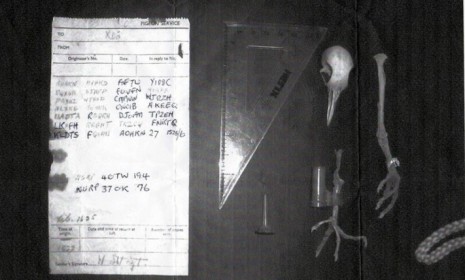The curious case of the uncrackable World War II code found on a dead pigeon
Britain's top code breakers, stumped by an encrypted message found on the leg bone of a bird, are looking to the public for answers

A free daily email with the biggest news stories of the day – and the best features from TheWeek.com
You are now subscribed
Your newsletter sign-up was successful
It seems at least one World War II-era carrier pigeon died in vain. Earlier this month, David Martin, a resident of Surrey, England, found parts of a decades-old pigeon skeleton when he was cleaning out his chimney. This was no ordinary pigeon. The bird had a red canister attached to its leg with a secret code inside — 27 groups of five letters each, which has completely stumped Britain's top code breakers at Government Communications Headquarters and at the prominent Pigeon Museum at Bletchley Park. Officials are hoping that the public release of the uncrackable message might uncover the necessary code books to decipher what the sender was trying to convey. But why is this missive proving so hard to crack? Here, a guide:
Why was this pigeon carrying a message?
During World War II, pigeons were used extensively to carry messages to Britain from mainland Europe. Flying at speeds of up to 52 mph, the birds can travel distances of up to 620 miles.
The Week
Escape your echo chamber. Get the facts behind the news, plus analysis from multiple perspectives.

Sign up for The Week's Free Newsletters
From our morning news briefing to a weekly Good News Newsletter, get the best of The Week delivered directly to your inbox.
From our morning news briefing to a weekly Good News Newsletter, get the best of The Week delivered directly to your inbox.
If this was common practice, why is this code so uncrackable?
Some 250,000 pigeons were used during the war by all military services and each bird was given an identity number. The message found on the pigeon in the chimney had two identification numbers — NURP.40.TW.194 and NURP.37.OK.76 — and it's unclear which one refers to the discovered bird. Complicating matters is that there's virtually no way to know who the sender — referred to as Sjt W Stot — was or the missive's intended destination, given as X02. The handwritten message of 27 groups of five letters, which is also frustratingly undated, is consistent with the use of code books to translate encrypted dispatches, but it's likely that the book with the code has been destroyed, a GCHQ historian tells the BBC.
What are some best guesses as to the origin of the message?
Two theories have come to light: The first is that a random key was applied to the message. If the key was truly random and known only to the sender and the recipient, says Gordon Corera at the BBC, then the code could very well be uncrackable. Another theory holds that the message could have been sent by an Army officer because the abbreviation Sjt was an old-fashioned Army spelling of the word Sergeant. But beyond that the sender's identity is a mystery.
A free daily email with the biggest news stories of the day – and the best features from TheWeek.com
Have the code breakers had any strong leads from the public?
Not so much. "The most helpful suggestion we had through all of this," the GCHQ historian says, "was from a member of the public who suggested that, since the message was found in the chimney, the first two words were most likely to be 'Dear Santa.'"
Sources: BBC, CNN, Reuters, The Wall Street Journal
Frances is a senior editor at TheWeek.com, managing the website on the early morning shift and editing stories on everything from politics to entertainment to science and tech. She's a graduate of Yale and the University of Missouri journalism school, and has previously worked at TIME and Real Simple. You can follow her on Twitter and on Tumblr.